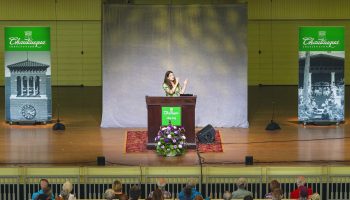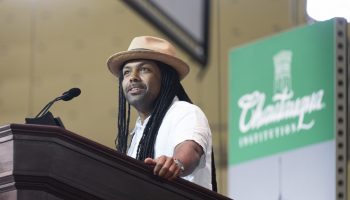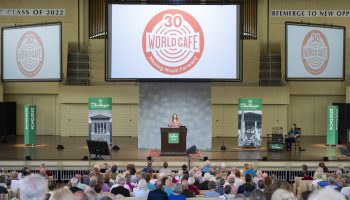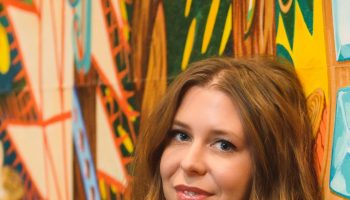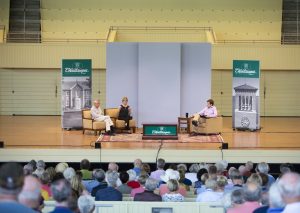
MHARI SHAW/STAFF PHOTOGRAPHER
Science has provided strong insights into the aging process, but Kate de Medeiros and Ron Cole-Turner are challenging the data, using culture to make the statistics less about numbers and more about the people they represent.
De Medeiros, the O’Toole Family Professor in Miami University of Ohio’s Department of Sociology and Gerontology, and Cole-Turner, the H. Parker Sharp Professor of Theology and Ethics at Pittsburgh Theological Seminary, joined Vice President and Emily and Richard Smucker Chair for Education Matt Ewalt in conversation at 10:45 a.m. Thursday in the Amphitheater, continuing Week Four, “The New Map of Life: How Longer Lives are Changing the World — In Collaboration with the Stanford Center on Longevity.” The two served as replacements for Joseph F. Coughlin, director of MIT’s AgeLab, who canceled due to health reasons.
“We can certainly look to literature, to mythology and to other things to give us clues into areas that science is now kind of taking up again,” de Medeiros said. “It’s exciting to be able to have data to pair with a lot of these ideas, but we inherit a very rich cultural history that helps us shed light into this meaning of growing older.”
With backgrounds in sociology and theology, respectively, de Medeiros and Cole-Turner provided insight into “The New Map of Life” by discussing longevity with respect to expectations of aging, age-shaming and wisdom.
Two central metaphors, “old age as childlike” and “pushing one’s limits,” can lead to misleading portrayals of older generations.
“That leads to things like elderspeak or treating older persons in an infantile way, or somehow devaluing the contributions an older person makes,” de Medeiros said. “We need to challenge some of the ways that aging is portrayed and the way that, because of that, it shapes our own experiences of growing older and our expectations.”
Those expectations, along with other aging misconceptions, drive people’s fears of getting older.
Cole-Turner and de Medeiros agreed that older generations are often mischaracterized as dependent. To Cole-Turner, people — no matter the age — are not independent to begin with.
“Recognizing that we are all, always, dependent upon the natural world, upon the human community, upon the work of others, upon commerce,” he said. “We are all always mutually interdependent and to let go of control, let go of the illusion that I am independent, that I not only did it my way, I went right to the very end doing it my way — let go of that.”
This idea of dependency in old age is particularly relevant to the idea of “age-shaming,” which de Medeiros said is so embedded in American culture that people engage in it without even realizing — in fact, most people do it to themselves.
“We might say, ‘Pardon me, I’m just old,’ or ‘I’m having a senior moment’ or, ‘What do you expect from an older person like me?’ ” she said. “I hear this a lot from other professors on campus, and what that does is reinforce that aging is bad.”
De Medeiros said older generations are not the only people engaging with age-shaming narratives. Children have also been exposed to age-shaming culturally — particularly through literature, film and television.
“If you look at children’s books, if older characters are present, they are either inconsequential or portrayed as incompetent,” she said. “If you look at Disney and you look at older characters, with some exceptions, older women are often these terrible witches that are trying to steal the youth to stay young.”
De Medeiros recently saw “Today Show” hosts use the new FaceApp to age their faces, something she struggles to find humorous.
“The app could also change your gender, but they would not dare do that because that would be offensive,” she said. “It begs the question, ‘Why is that funny?’ And why do we not do something about that?”
Technology presents a variety of problems and opportunities in aging. In regards to transhumanism, Cole-Turner said human beings should be able to use technology and resources that push them “beyond human limits,” such as using artificial intelligence to make up for the cognitive limits humans develop in old age.
However, in some cases, Cole-Turner said technology is damaging to the aging process, as people are driven to live longer in hopes that more inventions will continue to pile on extra years.
“It’s almost like I want to last long enough to benefit from the future goodies that technology offers,” Cole-Turner said. “If there ever is a pill to make us smarter, some sort of brain interface or some sort of cognitive enhancement that we can take successfully, I want to be around when it’s available. It’s almost a fear of missing out on the technological future that drives some of them.”
Cole-Turner said the problem of technology was most recently apparent in “Snapchat dysmorphia,” a phenomenon where plastic surgeons experienced a rise in patients wanting to look like their edited selfies.
“How do we make sense of that?” Cole-Turner said. “How do we make sense of this waiting period, waiting for that? How does that create a dysmorphia in our life map, not just in our understanding of our face, but in our life map? (We are) waiting for technology to become our savior, our deliverer from that fear, which are these images of aging that are not always too flattering.”
While the age-shaming narratives are wholly negative, “wisdom” has traditionally been a largely positive characteristic of older generations. But Cole-Turner said the concept of wisdom is not always fully understood, as wisdom must come from experiences — even those that are different from your own.
“I am wondering if we are missing wisdom because we are looking in only perhaps one place,” he said. “There is a wisdom that comes from experience that may be different from our own: Experiences of suffering, experiences of surviving in a racist culture, experiences of being marginalized and pushed to the side.”
Cole-Turner said a fuller wisdom requires transcending the mind, stretching the limits of empathy, unity and connectedness.
“That, to me, is the wisdom that pays these social benefits in terms of being slower to provoke, slower to react, slower to think badly of other people, more willing to say ‘I don’t agree with that, but that comes from a different perspective and I want to understand,’ ” Cole-Turner said.
De Medeiros said there are two sides to the coin of wisdom, as some people argue that wisdom warrants the dismissal of other people’s feelings.
“Some people argue that wisdom actually robs people of the power of being angry, because to be wise you are contemplative, you’ve come to terms with things, you’re not angry and you’re not demanding,” she said.
Going forward, de Medeiros said there are opportunities for society to change the conversation about aging. It starts with one word: inclusion.
“We see very few examples of older people being represented in positive ways and certainly even when so, it is such a small percentage of things,” she said. “We see older characters in movies, in television shows as being silly. We don’t have that kind of inclusion.”
In order for that inclusion to drive a more positive narrative, de Medeiros said people need to take the word “elderly” out of their vernacular.
“The term ‘elderly’ is a term that we don’t use in gerontology because it stereotypes a group of people based on age in generally negative ways,” she said. “It’s never used as a word of empowerment, it is always used to victimize, to draw pity or to draw ire.”
For Cole-Turner, changing the way the world views aging starts by claiming the course of one’s own life.
“However old or young you are, narrate your own life and recognize that whatever exactly is going on demographically, whatever exactly is going on technologically, it presents unique challenges,” Cole-Turner said. “But it presents unique opportunities for you to live into that uncharted future, in which you will only at the end discover who you are really meant to be.

